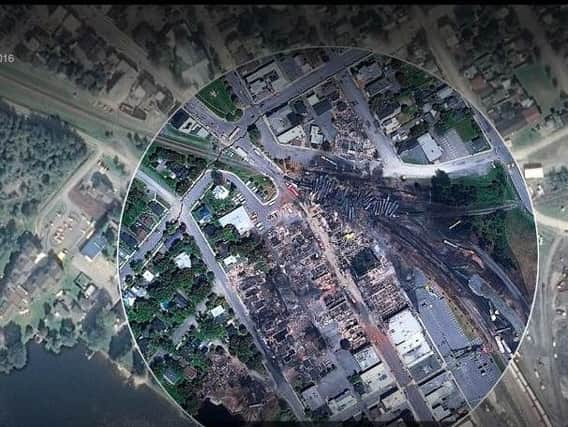Scotland’s space industry is exporting products and expertise around the globe


Not only does the sector sell satellites and associated software to the world’s space-exploring nations, the use of satellite data in a variety of industries from finance to construction is giving Scottish companies the edge in international markets.
Glasgow-based company Bird.i provides satellite imagery for business intelligence. Its client base is largely international, but it has a number of home-grown customers, including Glasgow fintech Trade In Space.
Together they are developing new financial services products using data collected from satellites. With the Bird.i platform, Trade in Space can monitor and predict crop yields, for instance, in South America.
Customers come from a variety of sectors, from hotel resorts looking for images for marketing purposes, to construction companies monitoring the build process, and energy companies building infrastructure such as windfarms.
“Trade in Space is using the information we aggregate to inform commodities traders,” Guillo explains. “We’re about efficiency and timeliness – we remove a need to travel to monitor from the ground and we upload new images every day so companies can use them to inform important commercial decisions.”
Guillo chose to establish Bird.i in Glasgow, rather than Oxford where he was based, because of the talent pool available. With the city’s space hub and the neighbouring tech hub in Edinburgh – not to mention world class universities across the country – it made sense. The company’s strong growth would seem to indicate Glasgow was a good choice.
As well as informing commercial activities, earth observation from space also has huge implications for monitoring environmental impact.
Environment
Edinburgh-based Space Intelligence uses satellite data to help companies monitor their environmental impact. Customers in North America or continental Europe can monitor projects in Africa or Asia to prove they’re not causing deforestation, for example.
“Companies such as Mars, Cargill and McDonalds have all got together under the Consumer Goods Forum to commit to zero deforestation in their supply chains by 2020,” says Space Intelligence chief executive Murray Collins. “Of course whenever you make a big commitment like that you have some way of monitoring your impact, and that’s where we feel we can come in. We apply our own algorithms to big data from space to answer questions about environmental management.”
It’s not just in analysing the downstream data where Scotland excels, the upstream sector is a world leader in the construction of satellites. Glasgow-based companies Clydespace, Spire and Alba Orbital are specialists in building the hardware, while companies such as Bright Ascension in Dundee build the software to operate these satellites.
Dr Mark McCrum, technical director of Bright Ascension, says that the technology could easily translate to other industries. “Anywhere there are remote systems, our software has potential – remote infrastructure in oil and gas for example, or robots or drones.”
It is true that the Scottish space industry is growing at a rapid pace – the Department for International Trade (DIT) estimates it could be worth £4 billion by 2030. To support this growth, the DIT launched a space exports campaign last year to enhance the position of Scottish and UK companies in the international market.
The offer to exporters includes space trade missions to priority markets such as the US and India, the sharing of detailed information about new markets and enabling access to a network of overseas market specialists.
In 2016-17, UK space exports were worth £5.5bn, and the industry currently generates more than 37 per cent of its income from abroad. In the same year, the UK space industry supported 41,900 jobs – with almost one-fifth of them based in Scotland.
“The Scottish space sector is dynamic and ever-growing, and Scotland alone is home to more than 130 space businesses, generating a combined income of £140 million,” says Dylan
Thomas, deputy director of technology, entrepreneurship and advanced manufacturing at the DIT.
Yet while certain industries are quickly cottoning on to the business benefits of incorporating satellite data, others are more conservative. Peter Young, former chief executive of Telespazio VEGA and now non-executive director at Global Surface Intelligence, says there is a fair amount of education still required.
“We’re at a tipping point,” he notes. “We don’t need these companies to set up departments, because that requires quite a high level of knowledge and there are commercial companies in Scotland offering that service. Insurance and assurance businesses are very interested in knowing more and, as it becomes more common, the belief will be there that the data is credible.
It’s a hugely exciting time for Scotland.”
The next big sectors to adopt space technology, Young predicts, will be construction, oil and gas and aquaculture. “We could detect algae blooms which may threaten fish farms – that kind of information would be extremely valuable,” he says.
“It’s funny, you say ‘space’ to someone and they imagine moon missions. There’s a lot of education still to be done as to what satellites can do and the value they can bring.”
Robin Sampson, founder and director of Trade in Space is convinced that his model is the future for many fintechs.
“More and more satellite data is being fused into all digital products and services, and to automate business processes, rather than just being used to inform decision-making,” says Sampson.
“This is a new and fundamentally more valuable way to use the global insights than looking at the earth from space gives us.
“More than ever before we can see the impact that the commercialisation of satellite data is having on the world. We’re uniquely placed in Scotland, in that we have a community highly skilled in everything from data analysis to rocket manufacturing.”